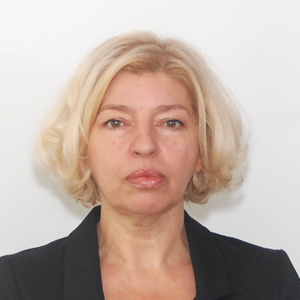Gordana Igric has been active in journalism for 34 years, starting as a journalist in 1981.for Belgrade based Politika and Borba dailies, covering the whole territory of former Yugoslavia.
During the war years she reported on the fighting and ethnic cleansing in Bosnia and Croatia in places such as Banja Luka, Zvornik and Foca.
Marked as a traitor, during 1999 she was forced to leave Serbia traveling in secret to Sarajevo and then on to London where she began working as an editor for the Institute for War and Peace Reporting and manager of the Balkans project.
The need for continued impact in the Balkans inspired Gordana Igric to localize the IWPR Balkans Project in 2005. establishing new regional organisation – Balkan Investigative Reporting Network, BIRN. Ten years later, BIRN, with a pool of close to 500 journalists, has offices in Albania, Bosnia and Herzegovina, Kosovo, Macedonia, Romania and Serbia, with editorial presence in Bulgaria, Croatia, and Montenegro, is one of the biggest media networks in the South Eastern Europe.
SEEMO: How often BIRN journalists are target of a threat? Can you give us some examples, please?
BIRN is celebrating decade of its existence and occasionally our investigations were cause for attacks, mostly threatening emails or phone calls. Some of the attacks were seriously vicious. Our editor in BIRN Albania, Besar Likmeta has been physically attacked by an Albanian politician, while the director of BIRN Kosovo, Jeta Xharra, has had several government campaigns orchestrated against her, branding her as “Serbian spy”. Currently, against BIRN Serbia, the government and allied media have launched smear campaign, branding us as liars, spies, mercenaries and lobbyists for some companies. The main accusation is that we are trying to overthrow the Government, being paid for that by the EU. All that for raising legitimate concerns about public interest and validity of Government spending. The proportion of latest smear campaign is beyond anything seen on media scene in Serbia.
SEEMO: It is very hard to be an investigative journalist…
Professional investigative reporting rarely receives plaudits from politicians or states, since in most cases it exposes corruption or malfunctioning of the state institutions. In its ten years of work, BIRN was exposed to different kind of reactions from the states in the Balkans. Control over the media is such that investigative reporting is limited mainly to non-governmental organisations, with rare access to mainstream media. Usually, this means the media, deeply dependent financially and politically on authorities are forbidden to carry sensitive stories, compromising for the governments.
SEEMO: How you see the media situation in the region BIRN covers?
Macedonia is for years a trouble spot, with the closure of independent media, arrest and conviction of investigative journalist Tomislav Kezarovski while the Government is one of the main media advertisers. The situation in Serbia is quickly deteriorating, with numerous complains about censorship and self-censorship. Shutting down of programmes, and increased government pressure on media outlets, with some TV stations and tabloids tasked to perform smear campaigns against political opponents, or anyone with different opinion is happening as we speak.
SEEMO: Your comment about the critics from the Serbian Prime Minister Aleksandar Vucic – he spoke about BIRN.
How does one respond to allegations that we are liars, undermining Serbian reforms on EU orders, lobbying for some international companies, etc? The prime minister keeps going out on TV and repeating outrageous accusations against BIRN. This in turn is then carried on all media in the country without anyone even approaching BIRN for response. We have no intention to get into a shouting match with the ones screaming “traitors!” but rather participate in a quality debate about the issues have raised on misuse of public spending.
The unprecedented reaction of the Serbian government to our latest story sends two fold message, both to the journalists in Serbia and to the EU. One, that anyone who dares to dig into the topics the Government deems inappropriate will have end up in a similar fashion. At the same time, the PM has used this case to test the limits of EU’s patience, in a situation when Brussels is rarely interested in developments beyond relations between Serbia and Kosovo.
All information and reference, which are contained in this webpage, were compiled after best knowledge and examined with greatest possible care. This disclaimer informs readers / users of the web and information that the views, thoughts, and opinions expressed in an interview by the interview partner or in a statement by the author belong solely to the interview partner / author and do not necessarily reflect the official policy or position of the South East Europe Media Organisation (SEEMO) Assumptions made within an interview-analysis are not reflective of the position of SEEMO. The visitors / users of the SEEMO webpage should take all steps necessary to ascertain that information you receive from SEEMO is correct. We ask every user to check references, double-check information from additional independent sources. SEEMO assumes no responsibility or liability for any errors or omissions, or for the results obtained from the use of information published on the SEEMO website / SEEMO partners website.

